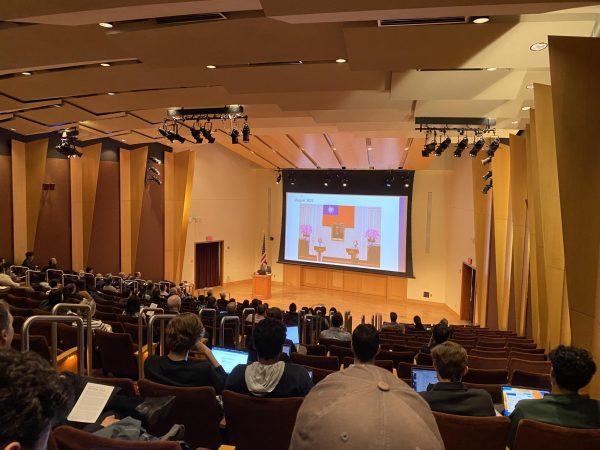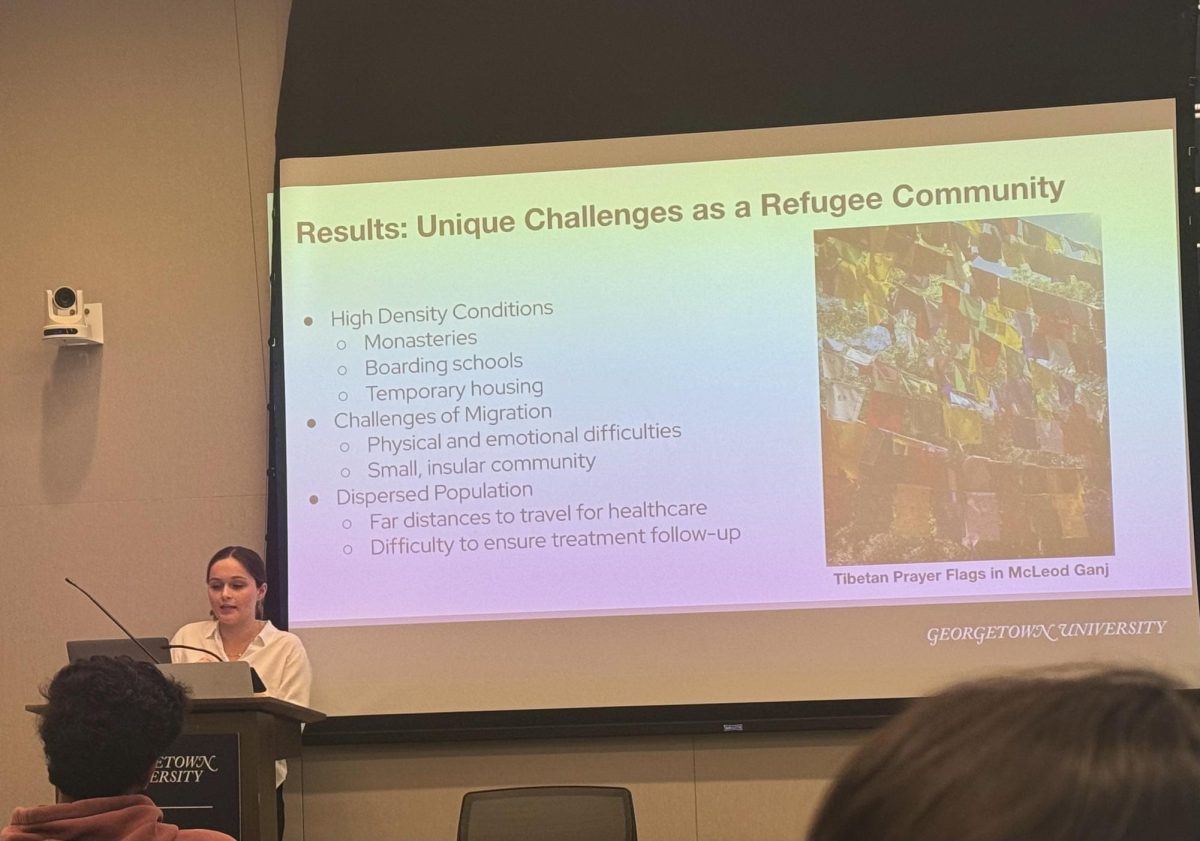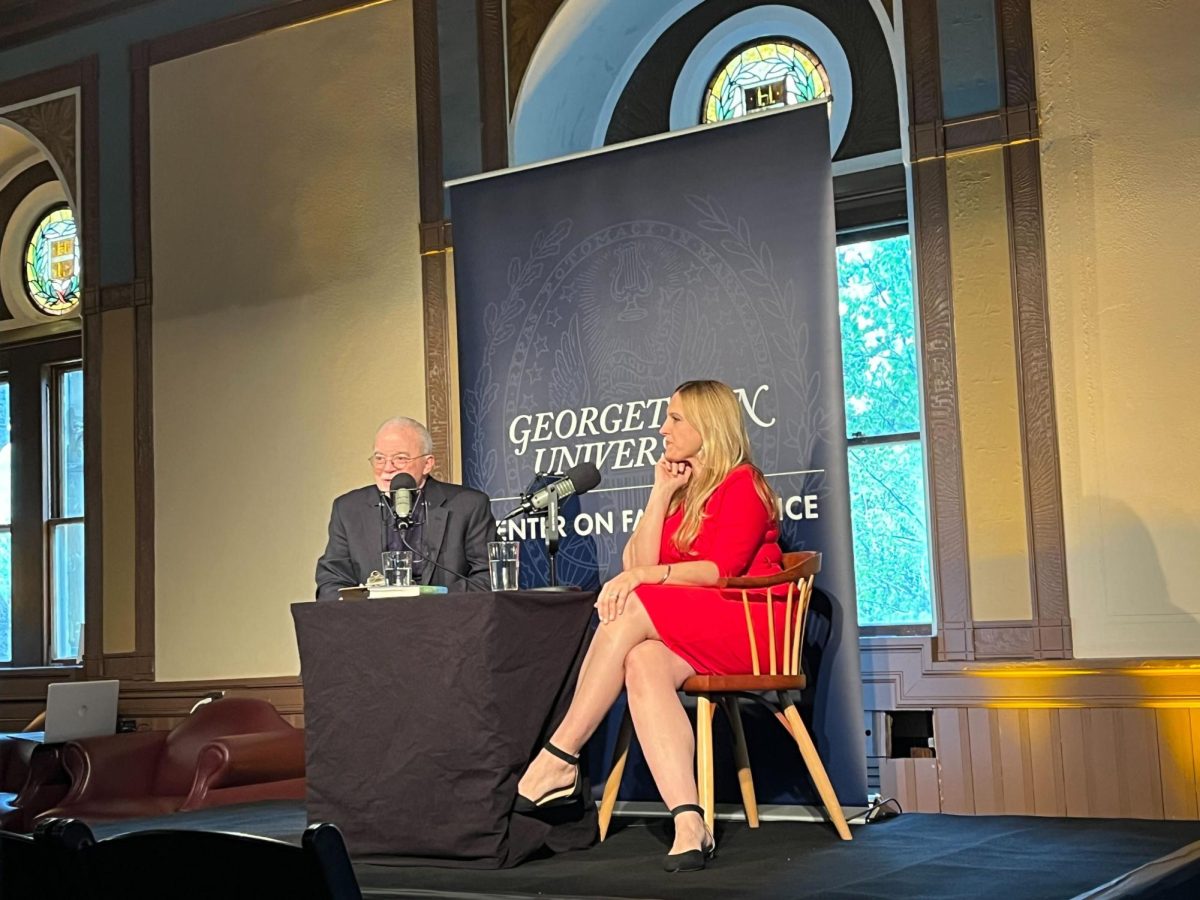A newly selected distinguished professor delivered a university-wide lecture concerning the role of economics in global power’s work to keep power in Lohrfink Auditorium Feb. 12.
Victor Cha, a professor of government, vice dean in the School of Foreign Service and D.S. Song-KF endowed chair in government and international affairs, delivered the lecture, titled “Collective Resilience: Countering the Weaponization of Economic Interdependence.” Cha examined the history of economic interdependence, including China’s use of economic ties to coerce other countries, and how to counter this tactic to provide state solutions for cooperation.
“I’m really very grateful for the opportunity to share some of my work today,” Cha said at the event. “It’s an honor.”
Georgetown University President John J. DeGioia (CAS ’79, GRD ’95) presented the award of distinguished professor, Georgetown’s highest professional honor, to Cha in November 2023. The award recognized Cha, who has served on the university faculty for over 25 years, for his scholarship in the relationship between the United States and Korea, Japan, China and other Asian countries.

“We could not be more grateful for everything you bring to our university community, your scholarship, your teaching, your service to deepen the work of our university and vital regions of the world,” DeGioia said at the event. “Providing invaluable leadership and public service in the transformative experiences of so many students over these two and a half decades, I have had the privilege of standing with you.”
Cha previously served as a member of the National Security Council and the deputy head of the United States delegation at the Six Party Talks, a sequence of negotiations in Beijing to deconstruct North Korea’s nuclear program. Cha currently is a member of the Defense Policy Board, a nonpartisan board under the Biden Administration that examines and analyzes defense policy.
According to Cha, economic weaponization is a type of coercion that countries like China use to gain political and territorial control over other countries.
In the lecture, Cha said that while China and the United States both exercise economic coercion, China employs this strategy more than any other country. This tactic prevents dependent countries from reducing their links to China, threatening the international order.
“It’s impossible to sever all ties from one of the largest economies in the world, being China,” Cha said. “So the key puzzle, or research question, that informs this work is how to counter the weaponization of interdependence without decoupling from China.”
Cha said China’s strategy of weaponization of interdependence would only privilege China, destabilizing other global relationships.
“When actors resort to economic coercion, they devalue the premium place of openness, integration and trust among factors,” Cha said. “The creation of such norms will lead states to seek autarchic solutions, devalue investments in relationships and prefer coercion to negotiation.”
Cha said that current strategies for countering trade weaponization, including total supply chain control, are inefficient because they maintain control over key elements of only one supply chain.
“This still leaves a universe of other items as targets for coercion,” Cha said. “You basically end up in a doubly negative position in the sense that the targets of economic coercion don’t get safe from coercers, and coercers still feel emboldened to coerce again.”
Cha said China’s strategy to establish economic interdependence with other countries aims to reduce their power, whereas the United States applies economic interdependence and economic policy to support other countries with backing from the United Nations.
“What distinguishes China’s weaponization of interdependence is its incorporation as a regular tool of diplomacy to achieve foreign policy goals,” Cha said. “When the United States uses these forms of economic coercion, they are usually formal. They are announced. We say who we’re targeting. It’s usually based in some sort of legal or multilateral basis.”
Cha said cooperation can be a useful strategy against China.
“Like-minded countries should consider a collective resilience strategy designed to stop Chinese economic coercion,” Cha said. “It is a credible threat by a group of states to carry up punishment in unison.”
Cha said he hopes the threat of global cooperation against China can serve as an effective deterrent.
“Hopefully, the threat of collective resilience would never have to be exercised,” Cha said. “In that sense, it is like deterrence and security. It requires both the capabilities and the political will, the resolve, of all involved to signal that actors are no longer going to accept economic bullying as a tool of diplomacy that threatens the liberal international order.”




















